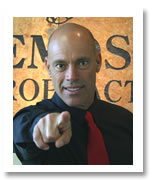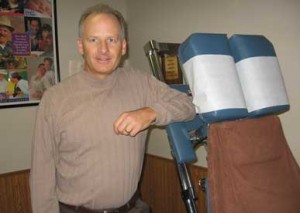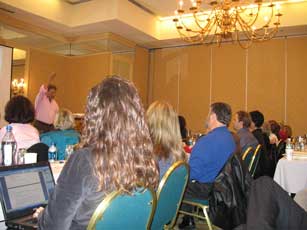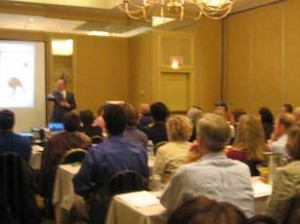Chiropractors: I think it might be time for a pep talk…
Have you been keeping up with the news lately? It’s hard not to.
Egypt, Tunisia, and now Libya recently had swift moving revolutions that resulted in regime change – all in the last few months. And other Middle East countries are also rumbling with protests.
Meanwhile, back in the States, our federal government doesn’t seem to have enough money and our representatives are threatening with a government “shutdown.” And next door here, in the Middle West, Wisconsin, there are thousands of people protesting around our state capital.
That’s a LOT of commotion!
So, how’re your patients doing with all of this? Are they worried? Is their pay getting cut? Are they loosing their jobs? Do they have jobs?
And how about you? Are you staying up watching the news, reading about it, discussing it? Are you worried? How is your income?
We need to be accurately informed about current events, of course. Unfortunately, we sometimes become so distracted that we can loose sight of what we are doing and let our businesses suffer.
A few years ago when the stock market plummeted, I received phone calls from doctors who were worried. One, who had been doing very well, was thinking about selling her office entirely. Another doctor who also had been doing well, let his practice numbers nose dive as he become mesmerized by the “news”, and was worried about racial riots and internment camps.
There is no doubt that economic conditions have been changing. But it has been our experience that if you constantly work on improving your services and in developing your business, and yourself, you will do just fine. (Good coaching helps too!)
BEST EVER
Last year, many of the offices we had the privilege work with had their best year ever. Most of them, in fact, had been in business for 15 to 25 years. I can think of 3 just off hand that have hit the “waiting list” category. They have reached near capacity with so many patients that they have to schedule new patients 1 week out. Horrible, I know, but very cool too.
DOING RIGHT
Success in this environment can be had. You can have it. You may have to change your past mode of operation, but you too can achieve it. It can be obtained by doing the right things, and doing those things right through a process of constant improvement. We call this the Practice Development Process.
BEING RIGHT
But to get what you want, you have to not only improve what you do, but improve who you are. You have to improve your outlook, your skills, and your personal habits. Success has much to do with how we view the world and what we put our attention on. As one old time doctor mentioned to me years ago, “success is an inside job.” By “inside”, he was referring to one’s thoughts and attitudes. He could talk: he and his doctors were seeing over 2,000 visits per week for years.
WORDS OF SUCCESS DURING TOUGH ECONOMIC TIMES
We have been going through what has been called the Great Recession. Many patients are worried about their jobs and their money.
Napoleon Hill wrote “Think and Grow Rich” in 1937 during the Great Depression as a result of studying and working with successful leaders, including President Roosevelt. It continues to be a best seller, perhaps the most popular motivational book of all time. In it he says:
“It is true that all thought has a tendency to clothe itself in its physical equivalent. … “The people of America began to think of poverty following the Wall Street crash of 1929. Slowly but surely that mass thought was crystallized into its physical equivalent which was known as a depression.”
THE 6TH FEAR
The thought that creates this depression, according to Hill, is fear. Hill talked about 6 types of fears, the worst of which is the fear of poverty. The other 5 were criticism, ill health, loss of love of someone, old age, and death.
“The Fear of Poverty is without doubt the most destructive of the 6 basic Fears.“
Hill states that one of the symptoms of fear of poverty is procrastination.
DO IT NOW
So, this is a pep talk to encourage you that there has never been a better time to grow your practice and expand your business.
Your patients need your leadership to help them with their own fears so that they can become more productive. By improving their health and educating them on the chiropractic lifestyle, their chances of succeeding in their lives increases. You and your team help them, their families and the community. You make a difference.
So, do it now. Increase your promotion. Stream line your procedures. Work on team training and improve your service. Plan your expansion for this year. Schedule a technique class. Read more. Work out more. Get enlivened with your purpose as a chiropractor.
New office? New doctor? Why not? People need chiropractic care now more than ever. And chiropractic has never been more popular. Even the quarterback for the winning football team of the Super Bowl gets regular chiropractic adjustments. (Naturally, since his dad is a D.C.)
Work with a practice building coach and get in the game – to win!
As Napoleon Hill says:
“Do it now! can affect every phase of your life. It can help you do the things you should do but don’t feel like doing. It can keep you from procrastinating when an unpleasant duty faces you. But it can also help you do those things that you want to do. It helps you seize those precious moments that, if lost, may never be retrieved.”
Fight the fear and the procrastination by just doing it. And soon, you too will be achieving your best ever again.
# # #
P.S. Napoleon Hill was a chiropractic patient. One report has it that B.J. Palmer was his chiropractor. Both men thrived during tough economic times. Here is an interesting story about Hill and chiropractic. LINK
Old movie of Nap Hill. 7 minutes. LINK










